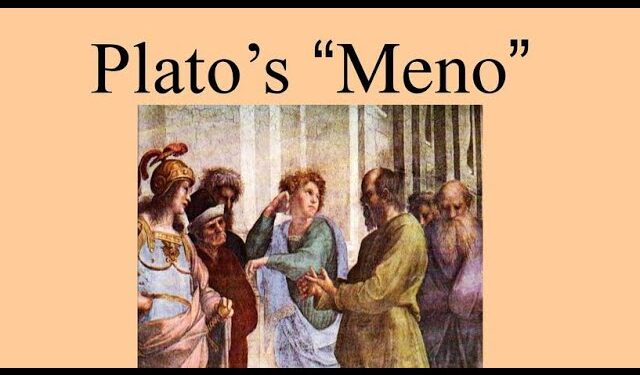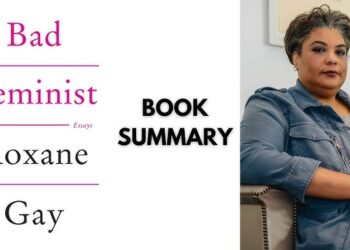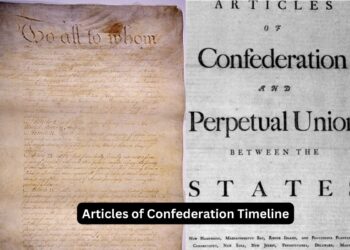Table of Contents
ToggleIntroduction to Plato’s Meno
Meno By Plato Summary And Themes Plato’s Meno is one of the dialogues that examines the nature of virtue, knowledge, and the process of learning. It is named after Meno, an aristocratic young man from Thessaly, who poses the central question of the dialogue: “Can virtue be taught?” This seemingly simple question leads to a rich exploration of key philosophical themes, such as the definition of virtue, the nature of knowledge, and the relationship between knowledge and education.
The dialogue takes place between Socrates and Meno, but it also introduces other characters, such as Anytus and a slave boy, who help demonstrate Socratic philosophy in action. The Meno is structured around a conversation in which Socrates attempts to demonstrate to Meno that virtue cannot be taught in the conventional sense, and that knowledge is something innate in human beings, accessible through proper methods of inquiry.Meno By Plato Summary And Themes
In this essay, we will summarize the Meno, explore its central themes, and answer frequently asked questions about the dialogue. Through the lens of this dialogue, Plato explores important questions about the nature of human knowledge and education that remain relevant in contemporary philosophy.Meno By Plato Summary And Themes
Summary of Plato’s Meno
The Opening Question: Can Virtue Be Taught?
The dialogue opens with Meno asking Socrates if virtue can be taught. Meno is curious about whether virtue is a kind of knowledge that can be learned from others, or if it is something innate, like a natural talent or gift. Socrates, as he often does, responds by questioning Meno’s understanding of virtue. He asks Meno to define what virtue is before they can answer whether it can be taught. This question sets the stage for the rest of the dialogue.Meno By Plato Summary And Themes
Meno gives several definitions of virtue, but Socrates systematically refutes each one. First, Meno offers a list of virtues specific to various groups, such as men, women, and children. Socrates rejects this definition, arguing that it is too vague and does not capture the essence of virtue itself. Meno then attempts a second definition, suggesting that virtue is the ability to rule over people justly. Socrates again rejects this definition, arguing that ruling justly is a part of virtue, but it does not fully encompass the nature of virtue.Meno By Plato Summary And Themes
Read More
After several failed attempts, Meno expresses frustration, stating that he is no closer to understanding what virtue is. Socrates, however, encourages him to keep searching for a definition. This marks the beginning of a more reflective inquiry into the nature of knowledge and virtue.
The Paradox of Inquiry: Learning as Recollection
As the discussion continues, Socrates introduces an interesting idea: the paradox of inquiry. Socrates claims that knowledge cannot be taught, but it can be recollected. To explain this, he tells Meno a story about the soul’s immortality. According to Socrates, the soul is immortal and has already acquired all knowledge in past lives. Learning, then, is not a process of acquiring new information but of remembering knowledge that the soul already possesses. This is often referred to as the doctrine of anamnesis or recollection.
To demonstrate his theory, Socrates asks Meno’s slave boy to solve a geometric problem, despite the boy having no prior knowledge of geometry. The slave boy, after a series of questions and guidance from Socrates, successfully solves the problem. Socrates uses this as evidence that the boy had knowledge of geometry all along, and that learning is simply a process of recollecting what the soul already knows.
The story of the slave boy illustrates one of the key themes of the Meno: that true knowledge is not learned but remembered. Socrates’ method of questioning leads the boy to recollect knowledge he did not consciously know, suggesting that learning involves tapping into innate knowledge rather than acquiring something entirely new.

The Nature of Virtue: Can Virtue Be Taught?
As the dialogue progresses, Socrates shifts back to the original question: can virtue be taught? After exploring the nature of knowledge and recollection, Socrates concludes that virtue cannot be taught in the conventional sense. This conclusion stems from the fact that there are no known teachers of virtue, and those who claim to teach virtue seem to fail in consistently producing virtuous individuals.Meno By Plato Summary And Themes
Socrates suggests that virtue is a kind of divine gift rather than something that can be taught. He argues that some individuals, such as the statesman Pericles, seem to possess virtue naturally, while others do not. This view challenges the assumption that virtue can be systematically transmitted from teacher to student. In a way, Socrates is suggesting that virtue is an inherent quality rather than a skill that can be taught through education.
The Final Thoughts: Virtue and Knowledge
In the final part of the dialogue, Socrates reflects on the nature of virtue in relation to knowledge. He suggests that there are many types of virtues, and each person might possess a different kind of virtue depending on their role in society. However, Socrates argues that all virtues are connected by the single virtue of wisdom. Wisdom, in turn, is a form of knowledge that guides individuals toward virtuous actions.
Socrates concludes that virtue cannot be taught because it is not simply a matter of knowledge. Rather, virtue involves a deeper understanding of the good and the just, which is not always accessible through traditional education. In this sense, the Meno ends with a recognition that knowledge and virtue are intertwined, but that true knowledge is more than simply the acquisition of information—it is an understanding that leads to virtuous action.Meno By Plato Summary And Themes
Read More
Key Themes in Plato’s Meno
1. The Nature of Virtue
One of the central themes of the Meno is the question of what virtue is and whether it can be taught. The dialogue begins with Meno’s inquiry into the nature of virtue and whether it is a form of knowledge that can be passed from teacher to student. Socrates’ exploration of this question challenges traditional views of education and suggests that virtue may not be a skill that can be taught in the conventional sense. Instead, Socrates implies that virtue is more connected to a kind of wisdom that is innate and revealed through the process of philosophical inquiry.Meno By Plato Summary And Themes
2. Knowledge and Recollection (Anamnesis)
A second key theme in the Meno is the nature of knowledge. Socrates argues that knowledge is not something that is learned in the traditional sense, but rather something that is recollected from past lives. This concept, known as anamnesis, suggests that the soul is immortal and has already acquired all knowledge in previous existences. The process of learning is thus a process of remembering what the soul already knows, rather than acquiring new knowledge.
Socrates’ demonstration of the slave boy solving the geometric problem serves as evidence for the theory of recollection. This is one of the more famous aspects of the Meno, as it introduces the idea that knowledge is innate and simply needs to be rediscovered through the right method of questioning.
3. The Socratic Method
The Meno is also a prime example of Socrates’ Socratic method—a method of philosophical inquiry that involves asking a series of probing questions in order to lead others to self-discovery. In the dialogue, Socrates uses this method to challenge Meno’s assumptions about virtue, knowledge, and teaching. Through questioning, Socrates helps Meno arrive at a deeper understanding of these concepts, even if they do not reach a definitive answer.
The Socratic method is designed to encourage critical thinking, and it is a key feature of Plato’s philosophical practice. By questioning others and engaging in dialogue, Socrates aims to help people recognize their ignorance and move toward a clearer understanding of fundamental truths.
4. The Question of Education
A major concern in the Meno is the question of education. The dialogue critiques the idea that virtue and knowledge can be taught in a straightforward, systematic manner. Socrates points out that even the so-called teachers of virtue do not produce consistently virtuous students, suggesting that teaching virtue is not as simple as imparting knowledge. This raises important questions about the nature of education and its limitations.
Socrates’ suggestion that virtue is a divine gift also implies that there are limits to human agency and control in the process of learning. While knowledge may be acquired through recollection, virtue may not be as easily accessible or transferable through education.
5. The Relationship Between Knowledge and Virtue
The final theme explored in the Meno is the relationship between knowledge and virtue. Socrates suggests that all virtues are connected by wisdom and that wisdom is a kind of knowledge that guides individuals toward virtuous action. This implies that virtue is not merely a matter of possessing particular skills or qualities but involves a deeper understanding of the good, the just, and the true.
Socrates’ assertion that virtue cannot be taught because it is not simply a matter of knowledge challenges conventional views of morality and education. It suggests that knowledge and virtue are closely intertwined, but that virtue is not something that can be taught through conventional educational methods.

Conclusion
Plato’s Meno remains a foundational text in Western philosophy, exploring profound questions about the nature of virtue, knowledge, and education. Through Socrates’ dialectical method, the dialogue delves into the relationship between learning and recollection, questioning whether virtue can truly be taught. Socrates’ ideas on knowledge, the soul, and virtue provide deep insights into the philosophical quest for truth, and continue to influence educational thought to this day. The dialogue invites readers to reflect on the nature of learning, the limitations of conventional education, and the role of wisdom in living a virtuous life.Meno By Plato Summary And Themes
Read More
(FAQ)
1. What is the central question of the Meno?
The central question of the Meno is whether virtue can be taught. Meno asks Socrates whether virtue is a kind of knowledge that can be passed on from teacher to student, or if it is something innate or acquired in a different way.
2. What is the Socratic method, and how does it function in the Meno?
The Socratic method is a form of philosophical inquiry where Socrates asks a series of probing questions in order to lead others to self-discovery. In the Meno, Socrates uses this method to help Meno understand the nature of virtue and knowledge, encouraging him to think critically and re-examine his assumptions.
3. What is the theory of anamnesis in the Meno?
The theory of anamnesis, or recollection, is the idea that knowledge is not something learned but something that is remembered. Socrates argues that the soul is immortal and has acquired all knowledge in past lives. Learning, then, is the process of recollecting knowledge that the soul already possesses.
4. Does Socrates believe that virtue can be taught?
Socrates argues that virtue cannot be taught in the conventional sense because there are no known teachers of virtue who consistently produce virtuous individuals. He suggests that virtue may be a kind of divine gift rather than a skill that can be passed on through education.
5. How does Socrates demonstrate the theory of recollection in the Meno?
Socrates demonstrates the theory of recollection by asking Meno’s slave boy to solve a geometric problem. Despite having no prior knowledge of geometry, the boy successfully solves the problem after a series of questions. Socrates uses this as evidence that the boy had innate knowledge of geometry that he was able to recollect through Socratic questioning.
6. What does Socrates mean when he says that all virtues are related to wisdom?
Socrates suggests that all virtues—such as courage, justice, and temperance—are ultimately connected by wisdom. Wisdom, in his view, is the knowledge that enables individuals to make virtuous choices and live just and good lives.
7. What is Plato’s view of education in the Meno?
Plato’s Meno critiques the conventional view of education as the mere transmission of knowledge. Socrates suggests that learning is not simply a matter of acquiring information but involves a process of recollection. Furthermore, he challenges the idea that virtue can be taught in the same way that knowledge is typically taught.Meno By Plato Summary And Themes
Read More
















